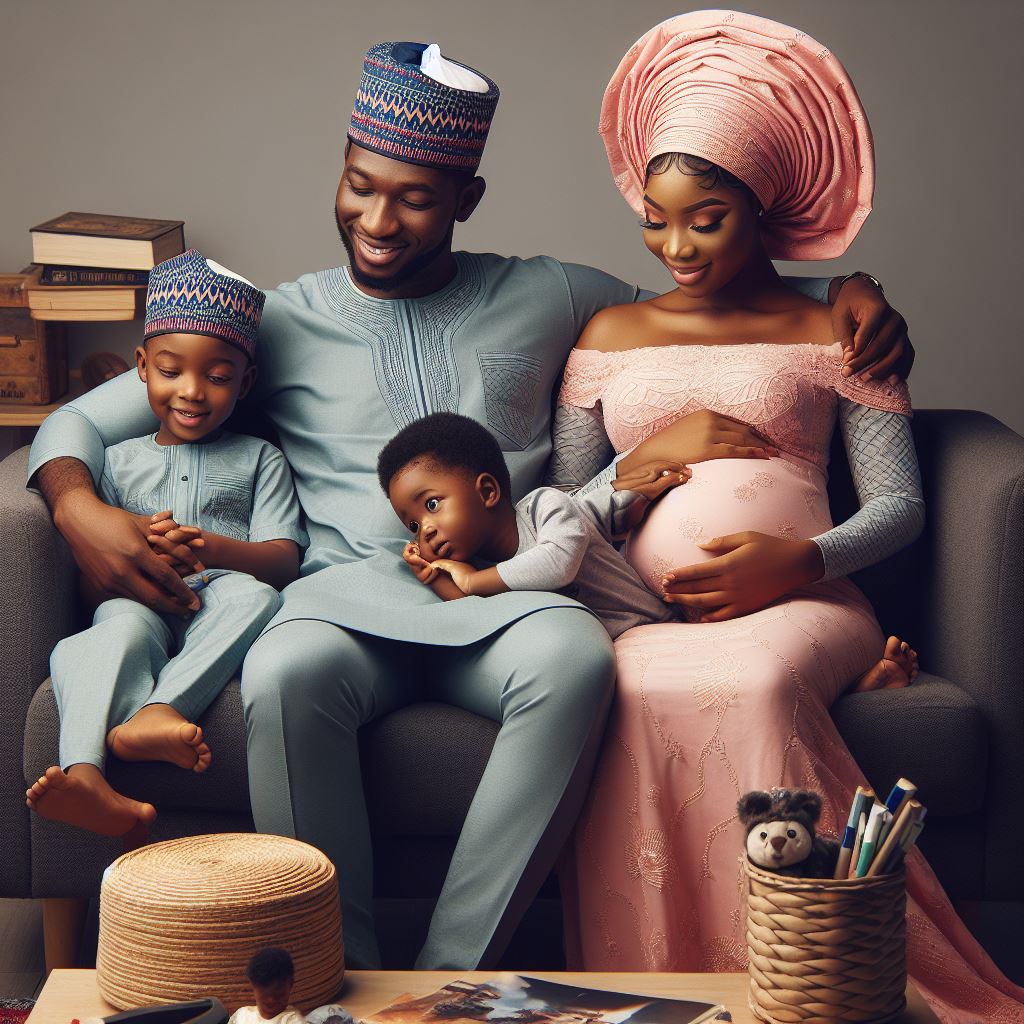Introduction
Healthy gender development is crucial for children as it shapes their identity and relationships with others.
In Nigeria, where cultural norms strongly influence gender roles, parents play a pivotal role in guiding their children.
In a society like Nigeria, where gender roles are deeply rooted in cultural norms, it is essential for parents to provide proper guidance to their children regarding healthy gender development.
Children develop their understanding of gender identity and roles through observation and interaction with their immediate environment, particularly their parents.
Parents serve as role models for their children, demonstrating and instilling values, behaviors, and expectations related to gender.
By actively engaging in their children’s gender development, parents can contribute towards dismantling harmful stereotypes and promoting gender equality.
Proper guidance by parents is crucial in helping children to understand and respect gender diversity.
It enables them to develop healthy attitudes towards themselves and others, promoting inclusiveness and acceptance.
Creating a safe and supportive environment at home encourages children to freely express their feelings, interests, and preferences, regardless of societal expectations associated with their gender.
Parents can foster open communication by encouraging discussions about gender roles and norms, challenging stereotypes, and promoting empathy and understanding.
By actively participating in their children’s gender development, Nigerian parents can help cultivate a society that not only acknowledges gender diversity but also promotes the equal dignity and rights of all individuals, regardless of their gender.
In fact, healthy gender development is of utmost importance in Nigeria, where cultural context heavily influences gender roles.
Parents have a significant responsibility to guide their children, fostering inclusiveness and promoting gender equality for a better society.
Read: Tracking Ovulation: A Pre-Pregnancy Guide
Understanding Gender
Gender and distinguish it from biological sex
Gender is a social construct that differs from biological sex through societal expectations and norms.
Parenting Made Just for You
Get personalized Parenting Solutions tailored to your child’s needs. Transform your parenting journey with expert guidance in 1-3 days.
Get StartedThe social construction of gender heavily influences children’s development, including their self-esteem and identity formation.
Gender identity refers to an individual’s deeply felt sense of being male, female, or non-binary.
Gender roles, on the other hand, are the behaviors, activities, and attributes that a particular society deems appropriate for each gender.
To fully understand gender, one must grasp the distinction between gender and biological sex.
Biological sex refers to the physical and physiological differences between males and females.
Gender, however, is a complex concept that extends beyond the binary understanding of male and female.
The social construction of gender and its influence on children’s development
Gender identity develops early in childhood and may align with biological sex or differ from it altogether.
It is crucial for parents and caregivers to create an environment that allows children to explore and express their gender identity freely.
Supporting children’s gender development means acknowledging and affirming their authentic selves.
Gender socialization significantly impacts children’s perception of their own gender and influences their behavior.
Parents play a vital role in shaping their children’s understanding of gender and breaking gender stereotypes.
When parents provide diverse and inclusive role models, it broadens children’s understanding of gender possibilities.
It is essential to expose children to different gender expressions and encourage them to develop their unique interests.
Parents should avoid making assumptions about their children’s gender preferences and let them navigate their own journey.
Unveil the Perfect Name that Tells Your Family's Story
Let us help you find a name that embodies your family's values, traditions, and dreams. Our personalized consultation weaves cultural insights to create a name that's uniquely yours.
Get StartedBy fostering open communication, parents can ensure a safe space where children can explore their gender identity.
Allowing children to choose their clothing, toys, and activities without judgment strengthens their self-esteem and autonomy.
Encourage children to question societal gender norms and empower them to challenge stereotypes.
The difference between gender identity and gender roles
Educate yourself about gender-related topics to be an informed and supportive parent for your child.
Be open to learning from your child about their gender identity and respect their self-identification.
Remember that gender identity might be fluid, and your child’s understanding of themselves can evolve over time.
Support networks, such as LGBTQ+ organizations or support groups, can provide additional guidance and resources.
Promote acceptance and inclusivity for all genders, ensuring that your child feels valued and loved unconditionally.
Emphasize that everyone deserves respect, regardless of their gender identity or expression.
Teach your child about consent, boundaries, and respectful relationships to combat harmful gender stereotypes.
Help your child understand that their worth is not determined by societal expectations of gender roles.
Encourage your child to stand up against gender-based discrimination and advocate for equality.
By actively engaging in discussions about gender, you can create an open dialogue and foster a gender-positive environment.
Remember that every child’s gender journey is unique, and the most important thing is to support and love your child for who they are.
Read: Infertility in Nigeria: Causes and Solutions Explored
Factors Influencing Gender Development
In the intricate tapestry of raising well-rounded individuals, Nigerian parents play a pivotal role in guiding their children through the maze of gender development.
Understanding the factors that shape this journey is crucial for fostering a healthy and balanced sense of identity.
Let’s delve into four key influencers: cultural norms, family dynamics, media, and peer influence.
Cultural Norms and Societal Expectations
Nigeria, with its rich cultural diversity, instills unique values regarding gender roles.
From early childhood, children absorb societal expectations, learning what it means to be a man or a woman.
Parents must navigate the delicate balance between preserving cultural heritage and allowing room for individual expression.
Encouraging open dialogue about these norms helps children develop a nuanced understanding of their identity within the cultural context.
Family Dynamics and Parental Influence
The family unit serves as the primary crucible for gender development.
Parents, as the first influencers, shape their children’s perceptions of gender roles.
It is vital for parents to model equality and challenge stereotypes within the home.
By fostering an environment where both boys and girls engage in a variety of activities, parents empower their children to explore their interests freely.
Media and its Impact on Shaping Gender Stereotypes
In the digital age, media plays a substantial role in shaping perceptions.
Nigerian parents need to be mindful of the content consumed by their children.
From television shows to online platforms, media often perpetuates stereotypes.
Encouraging critical thinking and media literacy equips children with the tools to deconstruct harmful narratives and cultivate a more inclusive understanding of gender.
Peer Influence and the Role of Friends and Classmates
As children grow, peer interactions become increasingly influential.
Parents can actively encourage diverse friendships, promoting an environment where children learn from one another.
By fostering inclusivity, parents help counteract the pressure of conforming to gender norms that may emerge from peer groups.
In short, fostering healthy gender development in Nigeria requires a multi-faceted approach.
By navigating the intricate interplay of cultural norms, family dynamics, media, and peer influence, parents can guide their children towards a balanced and authentic sense of self.
Read: Coping with Infertility: Emotional Support for Couples

Promoting Healthy Gender Development
Encouraging Self-Exploration
In the vibrant tapestry of healthy gender development, fostering emotional intelligence stands as a cornerstone.
As Nigerian parents, our role transcends societal norms, emphasizing the importance of emotional expression and understanding, irrespective of gender.
Modeling Gender Equality
Teaching our children to identify and articulate their emotions forms the bedrock of emotional intelligence.
Discarding the notion that certain feelings are exclusive to a particular gender, we encourage them to express joy, sadness, anger, and fear openly.
By dismantling these emotional stereotypes, we empower our children to navigate the complex landscape of their feelings without societal constraints.
Respecting Individuality
Moreover, instilling empathy becomes paramount.
Regardless of gender, we emphasize the significance of understanding and resonating with others’ emotions.
Through conversations and actions, we create an environment where compassion flourishes.
This not only strengthens familial bonds but also prepares our children for a world where empathy transcends gender boundaries.
Encouraging Emotional Intelligence
Equipping our children with healthy conflict resolution skills is equally crucial.
By discussing and modeling effective ways to navigate disagreements, we contribute to a society where individuals, regardless of gender, engage in constructive dialogue.
This not only promotes emotional growth but also dismantles stereotypes that associate certain conflict resolution styles with specific genders.
Educating about Gender Diversity
In the context of Nigerian culture, where emotions often play a central role in daily interactions, fostering emotional intelligence becomes a bridge that connects individuals, irrespective of their gender.
By embracing and celebrating the emotional spectrum, we pave the way for a future where our children are not bound by societal expectations but are free to express and understand themselves and others authentically.
In the next section, we will delve into the critical aspect of educating our children about gender diversity, ensuring that they grow up with a deep understanding and respect for all individuals, regardless of their gender identity or expression.
Read: Understanding Infertility: A Guide for Nigerian Couples
Conclusion
In the journey of parenting, fostering healthy gender development in our Nigerian children is a paramount responsibility.
As we recap the vital aspects discussed in this guide, it is evident that laying the foundation for positive gender development contributes significantly to a child’s overall well-being.
Understanding the importance of dispelling gender stereotypes and promoting equality from an early age is crucial.
By allowing children the freedom to explore a diverse range of activities, interests, and expressions, we empower them to develop their unique identities.
This not only enhances their self-esteem but also cultivates a society that values diversity.
Nigerian parents play a pivotal role in shaping the attitudes and beliefs of their children.
Embracing open communication about gender, fostering empathy, and challenging traditional gender roles within the family unit are effective strategies.
By doing so, we contribute to a cultural shift that celebrates individuality and inclusivity.
Encouragingly, Nigerian parents are increasingly recognizing the significance of healthy gender development.
By being mindful of the language we use, the toys we provide, and the expectations we set, we create an environment that nurtures our children’s authentic selves.
In our diverse nation, the celebration of various gender identities and expressions is not only a matter of personal growth but a collective responsibility.
By affirming our children’s choices and respecting their autonomy, we pave the way for a more accepting and tolerant society.
As we conclude, let us stand united in our commitment to fostering healthy gender development in Nigeria.
Our children are the future, and by empowering them to break free from restrictive gender norms, we contribute to building a more equitable and harmonious society.
For those eager to delve deeper into this crucial topic, numerous resources are available.
Books like “Raising Open-Minded Kids in a Closed-Minded World” by Susan C.
Green and online platforms such as UNICEF Nigeria’s parenting guides offer valuable insights and practical advice.
Together, let us embark on this journey of enlightenment, embracing the richness of diversity and ensuring a brighter, more inclusive future for the children of Nigeria.
[E-Books for Sale]
Parenting in the Digital Age
₦2,250 • 15 Chapters • 100 pages
Explore 'Parenting in the Digital Age,' a guide to navigating tech use, safety, and education for modern families. Essential reading.
See All 15 Chapters of this E-Book
Raising Financially Smart Nigerian Kids: 425 Lessons on Money & Entrepreneurship
₦5,500 • 17 Chapters • 425 lessons
Stop letting your kids grow up financially clueless in a country full of untapped opportunities.






